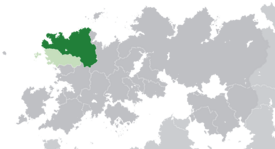North Ottonia
This article is incomplete because it is pending further input from participants, or it is a work-in-progress by one author. Please comment on this article's talk page to share your input, comments and questions. Note: To contribute to this article, you may need to seek help from the author(s) of this page. |
Ottonian Federal Republic | |
|---|---|
|
Flag | |
| Motto: "Liberty, Equality, Solidarity." | |
| Anthem: "Onward, Ottonia!" | |
 Location of North Ottonia (dark green) – in Belisaria (dark grey) – claimed territory (light green) | |
| Capital | Innsboro |
| Largest city | Dunnmaar |
| Official languages | Allamunnic, Eonese |
| Ethnic groups | Allamunnae, Eoni |
| Demonym(s) | North Ottonian |
| Government | Federal Democratic Republic |
| Establishment | |
| September 21st, 1872 | |
| March 22nd, 1943 | |
| September 21st, 1947 (ratified) | |
| January 1st, 1950 | |
| Population | |
• 2020 estimate | 96,768,590 |
| GDP (PPP) | estimate |
• Total | USD$2.037 trillion |
• Per capita | USD$21,050 |
| Gini (2018) | 21.4 low |
| HDI (2018) | .704 high |
| Currency | Oto (NOØ) |
| Driving side | right |
| Calling code | +414 |
North Ottonia, officially the Ottonian Federal Republic and often called Eona by its inhabitants, is a nation on the northwestern edge of the continent of Belisaria. It is bordered to the south by South Ottonia, Lyncanestria, and Sudmark, to the east by Erishland and Valgtea, and is neighbored across the North Thalassian Ocean by Ghant. The country was formed as a result of the Ottonian Revolution, arising in the zone controlled by the Popular Front movement and the previously-exiled republican government of Ottonia (which had been overthrown in 1921 in the Ottonian Reaction). The Popular Front and Ottonian Republic were formally dissolved as governing entities in 1947 with the ratification of the New Foundation, replacing them with the Ottonian Federal Republic. The Partition of Ottonia in 1950 formalized the modern border dividing North Ottonia from the remaining rump state of the Union of Ottonia.
North Ottonia is a federalized democratic presidential republic, with some technocratic elements. Economically, North Ottonia adheres to a model of market socialism, which utilizes a mix of public and state ownership of enterprises alongside employee-owned and cooperatively-owned enterprises within a market system used to allocate goods and services. Although classification varies among political scientists throughout the world, those within the OFR typically categorize it as a democratic socialist state.
